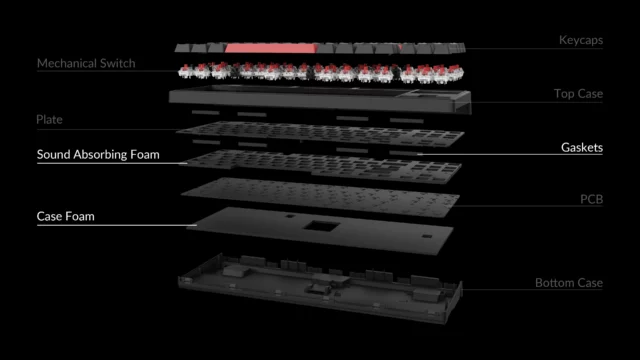Scharon Harding
When I tell people I prefer using mechanical keyboards, I often hear that they’re too expensive. Even people in tech circles have told me they can’t find a quality mechanical keyboard for a decent price. Is $28 decent enough for you?
That’s how much the Keychron C3 Pro is going for on Amazon right now. It’s a sale price that could change, but the keyboard was still only $35 when it released in September. Since September 21, I’ve been using the budget clacker as my primary keyboard, and it has kept up with my busy workload—writing about 17 articles for Ars Technica and more emails than I care to recount. Expensive mechanical keyboards often come with all sorts of perks worth obsessing over, but the C3 Pro proves that sometimes, cheap is good enough. Mechanical keyboards don’t have to be a luxury peripheral.
Meet the C3 Pro
-
The C3 Pro is Keychron’s lowest-priced mechanical keyboard.
Scharon Harding -
A profile view of the keyboard with (optional) side lighting visible.
Scharon Harding -
The keyboard’s underside has two pairs of flip-out feet.
Scharon Harding -
ABS keycaps could be replaced for better texture.
Scharon Harding -
Pictured with Keychron Red switches. You can also get the keyboard with Keychron Brown tactile switches.
Scharon Harding
Keychron’s C3 Pro is a tenkeyless (TKL) mechanical keyboard, so there’s no numpad. If you can get past that, you’re left with an affordable keyboard offering a typing experience that’s superior to any membrane or mechanical keyboard in this price range.
Unsurprisingly, though, there’s no wireless functionality. Another big caveat: This is an Amazon exclusive. If you don’t want to shop on Amazon for any myriad of reasons, you can’t get this keyboard, not even from Keychron’s own website.
A sweet sound
The C3 Pro isn’t the only cheap mechanical keyboard around. You’ll find plenty of them scattered across sites like Amazon from unknown brands like “Dierya” and “YUNZII.” But the C3 Pro is from Keychron, which makes fine, high-end mechanical keyboards we’ve tested before.
Beyond name recognition, the C3 Pro stands out by paying attention to its sound profile in a way that I haven’t seen from a budget mechanical keyboard before. There are even $100-plus mechanical keyboards that put seemingly no effort into eliminating pinging or keycap rattling the way that the C3 Pro does.
That’s not to say I never experienced any pinging with the C3 Pro during my month of use. I’d occasionally hear a metallic sound if I hit some keys on the top-left corner very hard. But that only happened rarely—and much less so than on the Razer BlackWidow V3 Pro, which goes for $180.
I tested the C3 Pro with Keychron’s Red linear switches (4 ± 0.4mm total travel / 2 ± 0.4 mm pretravel / 45 ± 10 gf to actuate). Pressing a key created a very light, plastic clack sound, with a similar, slightly higher-pitched sound occurring as the key reset. Larger buttons, like the spacebar, had a deeper, more thock-like sound when pressed. Sounds typically felt isolated to keypresses, and I didn’t have to endure the cheap rattling noises that often accompany budget mechanical keyboards and even some pricier prebuilts.
The sound profile can be attributed to foam underneath the keyboard’s top plate, as well as foam between the keyboard’s PCB and bottom case. The keyboard also has 16 poron gaskets, which Paul Tan, Keychron’s COO, told me “can also improve the typing sound.”

Keychron chose poron gaskets, Tan said, because poron is softer than silicone. The softness of the gaskets gives the keyboard some flex, but I had to type very forcefully to notice. Again, though, this is a sub-$40 mechanical keyboard we’re talking about here.
Linear switches are my least favorite type of switch, but the C3 Pro made up for that somewhat with very smooth switches that quickly reset. It was easy to hop from one key to the next for rapid typing. The switches arrive pre-lubricated, so they felt smooth and easy instead of scratchy and resistant.

